“Surviving Aba’s Unrest: One Young Man’s Escape from Tragedy Amid Deadly Riots”
By our reporter

What began as a family’s quest for reconnection and peace ended in bloodshed, leaving a young man orphaned and wounded amid the escalating unrest in southeastern Nigeria.
On March 3, 2021, Kelvin Marcus Ohio, a young Nigerian from Lagos, relocated with his parents to Aba in Abia State. The move, according to family friends, was driven by his father’s desire to rebuild strained family ties and reconnect with his wife’s ancestral roots. But within weeks, the family found themselves caught in the crosshairs of a deepening conflict in the region.
Abia, like many parts of the southeast, had grown increasingly unstable due to rising tensions surrounding the separatist movement led by the Indigenous People of Biafra (IPOB). Since the arrest of its leader, Nnamdi Kanu, in 2015, the agitation had intensified, often boiling over into violent confrontations between supporters and Nigerian security forces. By mid-2021, rights groups reported at least 115 civilian deaths in the region from clashes, reprisal attacks, and military raids.
Kelvin’s family hoped for a fresh start in Aba. His father, an experienced businessman, was rebuilding his trade. But violence was never far away.
On one tragic evening, the family’s worst fears became reality. Gunmen stormed their neighborhood, firing indiscriminately. Whether they were separatists or criminals taking advantage of the unrest remains unclear. As chaos unfolded, Kelvin was in the living room. His parents attempted to secure the house, but the attackers broke through.
“I watched my parents get shot right in front of me,” Kelvin later recounted. “My mother screamed, and my father collapsed by the wall, covered in blood.”
As the attackers searched the house for more victims, Kelvin managed to escape through the back door, sprinting into the bush. In the darkness, he fell into a hidden pit, fracturing his leg and sustaining deep cuts. Bleeding and immobilized, he lay in silence as the gunmen, believing him dead, moved on.
Several hours later, a local farmer named Obi — who had been hiding nearby —discovered the injured young man. Risking his life, Obi pulled Kelvin from the pit and rushed him to a hospital in Aba. The facility, already overwhelmed by riot casualties, admitted him for treatment.
Kelvin’s injuries were severe. His leg was placed in a cast, and multiple lacerations on his torso and thigh were treated. More painful, however, was the emotional trauma. He learned that his younger siblings had survived the attack by chance—they had been at a neighbor’s house at the time. But the family home was destroyed, and communication with his elder sister abroad was impossible due to damaged phone lines and widespread unrest.
The hospital served as a temporary refuge. IPOB’s sit-at-home orders had crippled economic life in Aba. Markets were shut, the streets deserted, and tension hung in the air. Nurses whispered about fresh attacks. Kelvin, grieving and wounded, focused only on surviving and reuniting with the remnants of his family.
“I don’t care about the politics anymore,” he said. “I just want my family back.”
From his hospital bed, Kelvin made a vow: to find his sister and begin to rebuild. Though the scars of that night—both physical and emotional—will remain, so too does his will to survive.
“I lost everything in one night,” he said, “but they didn’t take my hope.”





Leave a Reply